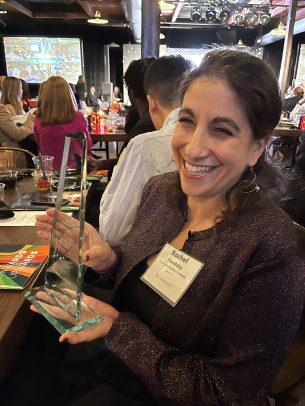Wastewater surveillance project wins Chicago Innovation Award

UIC Associate Professor Rachel Poretsky, from the UIC Department of Biological Sciences in the College of Liberal Arts and Sciences, accepted a Chicago Innovation Award Nov. 16 on behalf of a collaborative, multi-institution team effort to monitor the ebb and flow of COVID-19 in Chicago and Illinois by detecting the virus’s presence in wastewater.
The team was assembled by Discovery Partners Institute — the organization that received the award — and was one of the first teams in the nation to reliably analyze samples of raw sewage for evidence of SARS-CoV-2 RNA in 2021, providing real-time information to help both the Chicago Department of Public Health and the Illinois Department of Public Health during the pandemic.
The Illinois Wastewater Surveillance System is a collaboration between the IDPH and the DPI-led team which, in addition to UIC, includes Northwestern University and Argonne National Laboratory. Under a separate contract, DPI and those same partners provide similar services for CDPH.
Poretsky’s team at UIC includes Jarju Modou, visiting lab technician; Chi-Yu Lin, visiting research scholar; Dolores Sanchez, visiting lab manager; Adam Horton, lab manager; and UIC graduate students Leah Kelly and Christopher Owen.
“We are proud to be recognized by the Chicago Innovation judges after less than three years of DPI really getting off the ground,” DPI Executive Director Bill Jackson said. “Our success in wastewater surveillance shows the promise of our mission, which is to bring together the best minds in greater Chicago and beyond to solve some of the toughest problems facing society.”
“This honor belongs to our entire team,” said Laura Clements, DPI’s senior project manager for R&D. “Each one is crucial to the success of this undertaking — we literally couldn’t have accomplished this without them.”
Genetic material from the SARS-CoV-2 virus that causes COVID-19 is excreted in the feces and urine of infected people even if they have no symptoms. Suspended in raw sewage, these telltales eventually make their way into wastewater treatment facilities.
More than 75 wastewater treatment plants in metro Chicago and elsewhere in Illinois voluntarily submit sewage samples to the DPI team twice weekly. These are analyzed at a high-throughput lab built by UIC and then sent to Argonne for genetic sequencing to identify variants.
In Chicago, samples are also drawn directly from specific neighborhood sewers to get a more localized picture of COVID-19 trends, and at O’Hare International Airport to spot new variants that travelers might be bringing into the area.
Results are shared with public health decision-makers, wastewater plant operators and the public through a variety of mechanisms, including online dashboards.
Since its inception, the network has expanded to more than 80 monitoring sites measuring the exposure of more than 8 million people in Illinois to COVID-19, or more than two-thirds of the state’s population.
DPI and Shield T3, a for-profit startup spun out of University of Illinois, are also conducting a pilot program to test wastewater for the coronavirus at public schools.
Drawing from these experiences, DPI additionally is partnering with UIC and Rush University Medical Center to collect and analyze wastewater to identify the presence of potentially deadly antibiotic-resistant organisms in long-term care facilities. And the DPI team recently began screening sewage samples for influenza A and B for the state.
Chicago Innovation’s mission is to empower the Chicago Innovation Ecosystem by educating, connecting and celebrating innovators. The Chicago Innovation Awards began in 2002. The more than 350 previous winners cut across all industries, representing big companies, small companies, for-profit and not-for-profit, high-tech, low-tech and no-tech. They demonstrate the breadth of innovation that is unique to the Chicago region.
